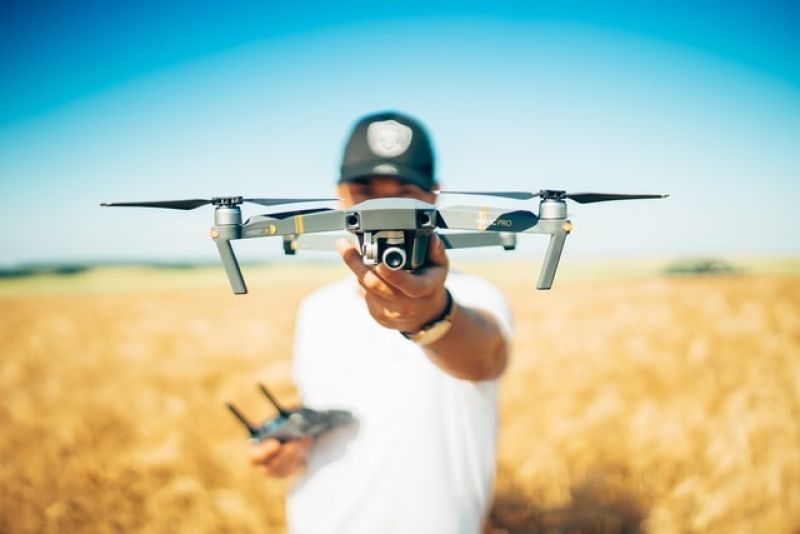From a fad and novelty toy in the early 2000s, drones have quickly become an integral asset for many industries. Their unique ability to quickly and cheaply access remote locations and difficult terrain, scale tall buildings, and provide unparalleled aerial views have made them a hit for photographers and videographers, and an asset for building managers, safety technicians and many more people besides.
This popularity has seen the emergence of drones as a serious business opportunity in the UK. However, it has also seen growing regulation around the use of drones, and controls on where and when they can be used. Here’s everything you need to know about starting a drone business in the UK, from the wealth of opportunities, to legal issues, to the fundamentals of starting and running a business.
Drone business opportunities
Drones are generally used for two main reasons. One is to quickly and easily access difficult to reach places, generally in order to film or observe them. This might include inspecting the facade or roof of a building, where using a drone is faster, safer and more cost effective than having a person scale the building. Drones are also commonly used to survey large areas on the ground, such as checking the health of crops on farmland.
The second reason is for aerial photography and videography. Drone footage has become a popular choice for weddings, for businesses (either as part of branding videos or for website banners), and for location shoots in the film and TV industry, as well as on YouTube. Drones allow for shots of landscapes and large crowds that are otherwise impossible to produce, and are ideal in that they require minimal setup.
Related article: How European businesses can break into the UK market
A drone business might focus on one of these specific areas, such as providing drones for the construction or agriculture industries. This would allow for you to master the specific requirements of these industries, and give a stronger appraisal of costs and timescales. Alternatively, you might choose to make your services available more widely, relying on your piloting skill and knowledge to provide a range of services as needed. This can be trickier, but it will also mean that you are not limited by seasonal work.
How to start a drone business
The UK is a great place to start any kind of business, ranking 8th in the world in the World Bank’s Doing Business index. When it comes to starting a drone business in the UK, you’ll benefit from a rapidly growing drone sector, predicted to grow to £42 billion by 2030, and strong construction and agriculture sectors, among other drone opportunities.
Starting a drone business in the UK requires some consideration of UK drone laws, as well as careful planning of finances, targets and timescales, and a strong marketing strategy. Here are the things you need to know to start your own drone business, and the steps you’ll need to take to go from startup to drone success story.
Step 1: Choose which drones to fly
Before you even start to think about what industries you will serve and the scope of your business, you need to decide which drones you will be flying. This will have an impact not only on your costs and what you can use the drones for, but on the training you will need. Under UK law, most drones under 250g in weight do not require a professional license to fly, a rule which encompasses both small hobbyists drones and lightweight commercial (C0 class) drones.
In order to operate a heavier drone, you will need to obtain both a Flyer ID and Operator ID. The Flyer ID is required by each pilot, and consists of a free online theory test. The Operator ID is acquired by the business, with an annual renewal cost of £9. The operator is responsible for ensuring that their drone pilots have a valid Flyer ID, and for labeling their drones with a valid Operator ID. Beyond this, there are also a series of regulations for where and how you fly. While most drones will fall into the Open category, some may require a license from the CAA.
Step 2: Write your business plan
A strong business plan is a foundational document for any business. Your business plan should be something that drives you forward, but also acts as something to fall back on in case you ever lose your way. This will encompass your business’ mission statement (what you intend to do) and your vision (how you intend to achieve it). This should be backed up with a clear plan of how your business will establish itself and grow, including estimated costs and timeframes.
Related article: UK business - how to hire workers from the EU post-Brexit
Your business plan not only helps to guide and measure your progress, but also to acquire investments. Both banks and other investment partners will need assurances that you know what you are doing, and that you have a clear and achievable plan for success. Often, the process of writing your business plan will actually highlight issues or stumbling blocks - and it’s better to discover these yourself than when you’re pitching your idea to investors.
Step 3: Choose a company structure
The next step is to choose the company structure that best suits your business. Business structures in the UK include:
● Private limited company (Ltd)
● Public limited company (Plc)
● Limited liability partnership
● Branch
These company structures require at least one director and shareholder, while a company secretary is also recommended. While the minimum share capital is £2, it’s generally recommended that you deposit at least £100 into your corporate bank account.
Most small businesses will form as a private limited company (Ltd). This offers limited liability, meaning that if the company is ever wound up, the only costs incurred by the company would be in the form of unpaid shares. A private limited company only requires one shareholder, and has no minimum capital requirement, while accounts are filed annually.
Step 4: Register your business
Once you have a concrete plan for your business and have chosen a company structure, you can begin the incorporation process. This involves completing the application form IN01, and filing for registration with Companies House. This process can be completed either with paperwork or digitally, with varying fees depending on the method and whether you require an expedited service.
Related article: How to open a company in the UK
This process includes submitting various information, including the business name, business structure, the nature of any liabilities, a statement of share capital and shareholders, and your registered office address. Since 2016, new businesses must also define any Persons of Significant Control (PSC), which define other kinds of influence over business decisions.
Step 5: Register your taxes
There are a series of taxes your business will likely have to pay, and thus will have to register for. These include national insurance, pay-as-you-earn (PAYE) tax for employee wages, and value added tax (VAT). While VAT is conditional - you only need to register for a new company if you expect to exceed £85,000 of turnover in the next 30 days - you may opt to register anyway.
Step 6: Invest in equipment
While this can be completed at any stage, now is a good time to ensure that you have the equipment you need for your drone business! This primarily means investing in the drone or drones themselves, as well as anything you may need to support and maintain them. Various websites include breakdowns of the best drones for different purposes, with different types of cameras, sensors, and different flight capabilities.
It’s likely that you will want at least two drones initially to account for the potential loss of one, but you should think about the capabilities of both, and whether you intend to use them in tandem, for different purposes, or simply to have one as a backup. You may also want to consider how you train pilots in performing their specific role, and whether this poses an additional risk. Drone flight simulators are available to provide a similar experience to piloting, and prevent you from having to risk your brand-new hardware.
Step 7: Acquire relevant insurance
The next step is to make sure that you have all the requisite insurance, both for your company and your assets. On the company side, this will include things like employer’s liability insurance. This is a mandatory requirement, and must be acquired from an approved insurance company. Your insurance must have a limit of indemnity of at least £5,000,000, with potential fines for each day you do not have this insurance.
You may also need to insure your equipment. This may be for protection in case of loss, but may also be a legal requirement, such as for drones classified as unmanned aircraft systems (UAS). This insurance must be EC Regulation 785/2004 compliant, and should cover every potential flight, whether that is a per-day or annual policy. More information on the definition of a UAS and the insurance requirements can be found via the link in Step 1.
Step 8: Find your audience
Once the drudgery of paperwork is out of the way, all that remains is to find your first clients. With drones still a nascent market for many businesses, you may find some immediate opportunities in paid media, such as Google Ads and remarketing. However, a more economical method initially is likely to be networking, word of mouth, and building a strong presence on social media, in order to present yourself as a legitimate business with an attractive service.
Drones are primarily used to take photos and videos, so including some of these of your hardware on your website and social media channels is a great practical demonstration of your services. While traditional channels such as Twitter, Facebook and YouTube may allow you to present this media better, building a presence on LinkedIn is likely to be the best use of your time. This business-oriented platform is an ideal place to build contacts, discuss opportunities, and share stories that impart the growing potential of drones in a variety of business sectors.
If our article has inspired you to start your own drone business in the UK, consider enquiring about our UK company formation service. We take the hassle out of starting a business in the UK, taking on the burden of paperwork and allowing you to focus on the things that matter.
For more information about opening a bank account or company formation in the UK, including cheap company registration, VAT and accountants, please contact us on 0033 (0)1 53 57 49 10 or email us from our contact page, and we’ll be happy to help.






